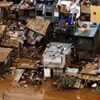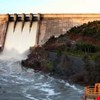CRITICAL CHALLENGES
This section provides a brief overview of the critical challenges that hamper human development. The challenges are grouped into five areas; of course there are other possible categorization and approaches to the critical challenges. The section also provides some background on the scale and nature of each critical challenge and considers why more attention needs to be paid for effective interventions. It further draws some of the key knowledge resources needed to better understand and to provide the solutions for tackling and addressing these challenges.The Critical Challenges and Cross Cutting Issues are complementary sections to IWRM ToolBox Tools.





